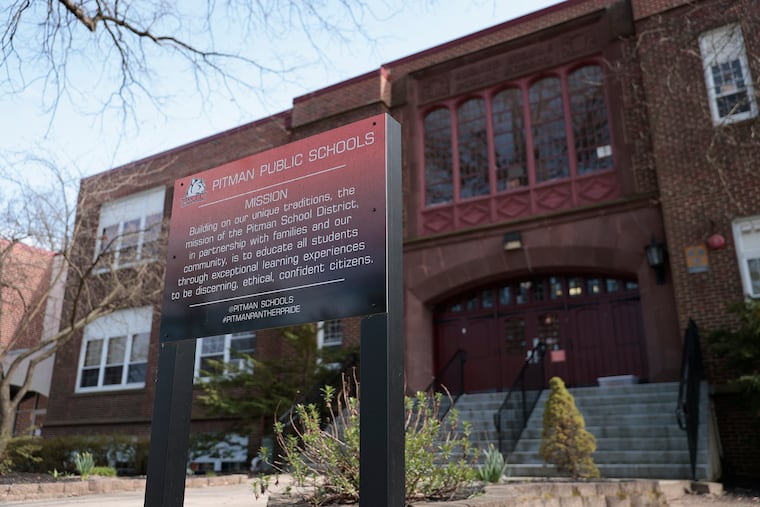New funding will help rescue some N.J. school districts facing budget cuts — for now
A bill signed by Gov. Murphy Monday and overwhelmingly passed by the Legislature last week will provide a partial bailout with $103 million divided among 168 eligible districts.

When New Jersey released proposed spending figures on school aid for the upcoming academic year, interim Pitman School Superintendent Steven Crispin began sounding the alarm for his Gloucester County district.
The outcome could be dire, he said: closed schools, grade-level reconfigurations, and layoffs, and other cuts to make up for a $973,000 anticipated drop in state aid.
A bill signed by Gov. Murphy Monday and overwhelmingly passed by the Legislature last week will provide a partial bailout with $103 million divided among Pitman and 167 other eligible districts around the state. But school officials say that one-time money is a temporary fix to a bigger problem.
“After all of the disruption to learning through the pandemic, the last thing we need is for families to worry about teachers being laid off or services being cut,” Assemblyman Roy Freiman (D.,Somerset) said in a statement shortly after the vote.
» READ MORE: Murphy unveils $53.1B budget, renewing property tax rebates
Murphy reached a deal a few weeks ago with Democratic lawmakers to make a supplemental funding allotment to help offset planned reductions under the S-2 funding formula, which changed how the state calculates aid through the 2024-2025 school year.
Pitman School Board President April Miller said the additional aid “would soften the blow” of expected shortfalls, but the board still expects to consider the cuts proposed by Crispin later this month, she said.
“We are appreciative of this measure, but there is still work to be done to address the larger challenges in the school funding act,” Miller said, referencing how the state calculates aid based on enrollment, poverty levels and other factors. “We are in a very precarious financial position.”
Added Crispin: “This does not completely address the needs we have as a district.”
The Democratic-controlled legislature fast-tracked the bill as districts were preparing budgets for the 2023-2024 school year based on projections under Murphy’s proposal last month.
The proposed budget would increase total education spending next year to $10.75 billion, with increases in 407 districts of 600 districts, including Camden. But other districts like Pitman would receive less than previous years. The budget also would increase pre-K funding by $110 million.
The cuts stemmed from reductions in the funding formula New Jersey uses to allocate aid. Now, the new law will restore two-thirds of the state aid slated to be reduced in the proposed 2024 fiscal budget. The supplemental funding will come from the state’s Property Tax Relief Fund.
In South Jersey, 20 districts in Burlington, Camden and Gloucester Counties will get additional funding, including Lenape Regional, Evesham, Somerdale and Clearview Regional, and Washington Township. Wenonah will get the least, with $23,466.
Lawmakers are hopeful that the supplemental aid will prevent the need for drastic cuts. Districts also must request additional aid from the state Department of Education to cover the gaps between how much they received last year and what is projected for next year. The districts must give the state a written plan on how they intend to fund operations in future years when the additional aid is no longer available.
» READ MORE: A perfect school funding system is hard to find. As Pa. searches for a fix, here’s what other states do.
Sean M. Spiller, president of the New Jersey Education Association, applauded the bill, saying it will help to “ensure that students will have the people and programs in place that they need for a successful 2023-24 school year.”
Miller said her district, which has seen a $4 million reduction in state aid in recent years, hopes to maintain current programs and class sizes. She has echoed calls for changes in the school funding formula, which has been debated for years.
The Pitman school board plans to consider a proposal to close its century-old neighborhood schools, Elwood Kindle Elementary and Memory Elementary, Miller said. Those students would be moved to Pitman Middle School, and seventh and eighth graders would be enrolled in the high school, she said.
Miller said about 25 to 30 jobs would be cut with the school closings, leaving the district to operate three schools, she said. Even though the district’s current shortfall would be covered by the new bill’s spending, the district is planning for the years beyond.
“We have no other course of action at this point,” Miller said. “We’re going to have to do our best to operate in the leanest capacity.”